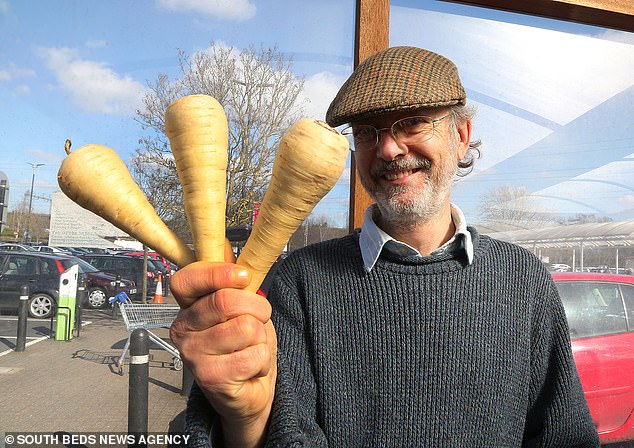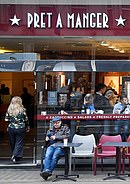Shoppers give Tesco the thumbs up as supermarket giant removes plastic-wrapped fruit and veg from its shelves in a pilot scheme aimed at cutting down on packaging waste
- Scheme at two Tesco stores will see it only sell 45 types of fruit and veg loose
- It will sell fresh produce including apples, onions and mushrooms unpackaged
- Chain’s move could prevent production of millions of plastic bags and punnets
- Shoppers becoming increasingly aware of harm caused by plastic packaging
Shoppers today backed Tesco’s decision to only sell 45 types of fruit and veg loose in a trial aiming to reduce plastic pollution.
Under the scheme at two stores, Britain’s biggest supermarket will only sell fresh produce including apples, onions and mushrooms unpackaged.
It hopes to extend the initiative to all of its supermarkets in a move that could prevent the production of millions of plastic bags and punnets.
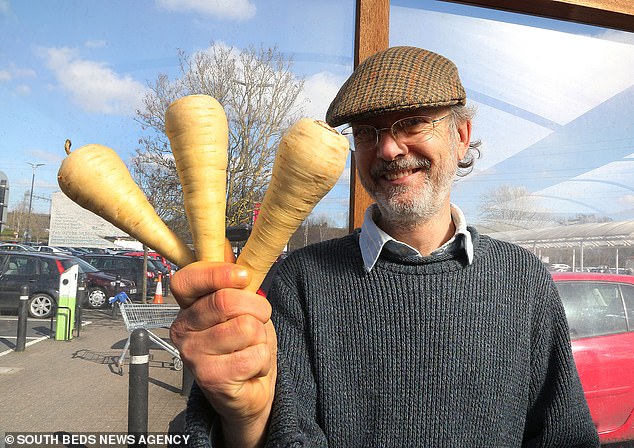

Mark Eliades, a Tesco shopper in Watford today, said: ‘I am 100 per cent behind this idea. I have to smile when I see people picking up bananas and putting them in plastic bags’
The changes at the Watford and Swindon stores come as customers become increasingly aware of the harm caused by plastic packaging that cannot be recycled.
Tesco said it would closely monitor each of the 45 products to see if the move increased food waste – and shoppers in Watford gave their backing to the news.
Lindsey Nicholson said: ‘It’s got to be a good thing and it’s coming at the right time, because people are now getting into the habit of recycling and thinking much more about it.’
Jean Chattergee added: ‘To know there is a store taking steps to reduce plastic packaging would make me use it. I am quite happy to pick up loose items and put them in a paper bag or my own bags.
‘People have just got to make sure they are organised when they go shopping and that they have the bags for life for putting fruit and veg in.’
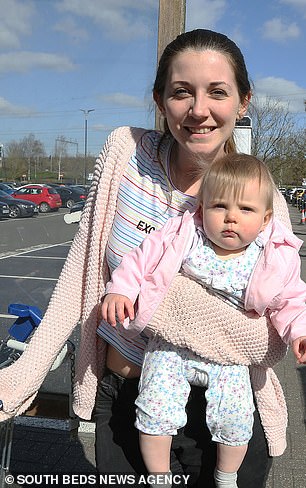

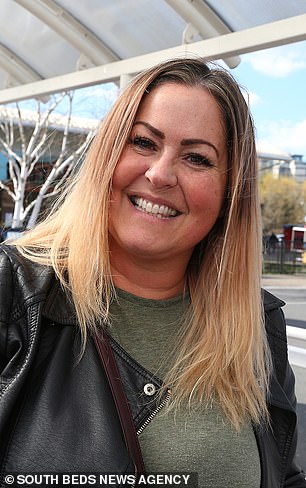

Laura Thomas, who was out shopping with her baby daughter Marlie (both left), said: Anything that reduces the plastic you come away with from a supermarket has got to be a good thing. Lindsey Nicholson (right) said: ‘It’s got to be a good thing and it’s coming at the right time’
Dhaval Pandya said: ‘It’s a brilliant idea and I’m fully behind it. I try and think carefully now about the whole issue when I go shopping.’
And Tina Mohar said ‘It’s a great idea. Anything that cuts down the packaging you end up with when you go shopping is a good idea. I always take my own bags with me. Let’s face it, the packaging can be ridiculous these days and just fills up the house.’
Mark Eliades said: ‘I am 100 per cent behind this idea. We have to do something. I have to smile when I see people picking up bananas and putting them in plastic bags.
‘You want to tell them that a banana has its own packaging, and why do I need a plastic bag for a few parsnips?
‘I am an outdoors type of person so am regularly out fishing and it’s so upsetting when you see the amount of plastic and rubbish floating by on the water.’
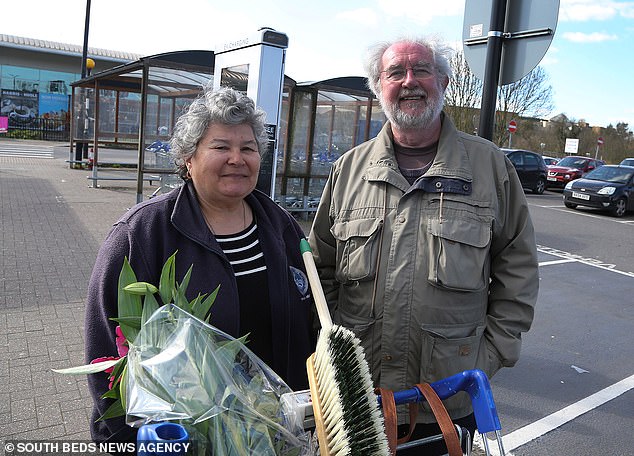

Dave Mason and his wife Pamela emerged from the store with shopping for their son who has just moved to Britain. Mr Mason said: ‘I think it’s a good idea’
Laura Thomas, who was out shopping with her baby daughter Marlie, said: ‘As a new mother, I find myself thinking more and more about what sort of world my daughter is growing up into.
‘I am more than aware that we have to look after it and do what we can for her generation. Anything that reduces the plastic you come away with from a supermarket has got to be a good thing.’
Dave Mason and his wife Pamela emerged from the store with shopping for their son who has just moved to Britain. The couple live in Malta but came over to the UK to help their son with the move.
Mr Mason said: ‘I think it’s a good idea. We brought our own plastic bags today to the store and brought nothing out with us. Back home in Malta, we do what we can to reduce waste packaging.
‘If you can reduce the packaging that goes around fresh food, it’s got to be an excellent move and we support it completely.’


Jean Chattergee said: ‘To know there is a store taking steps to reduce plastic packaging would make me use it. I am quite happy to pick up loose items and put them in a paper bag or my own bags.
The Tesco initiative, which follows similar trials by Marks & Spencer and Iceland, is significant because it is the UK’s biggest supermarket chain.
Other national chains, such as Morrisons and Waitrose, are moving in the same direction by, for example, doing away with plastic packaging in favour of paper bags or other recyclable materials.
The changes come in response to a backlash from shoppers who have been alerted to the harm caused by plastic packaging to the environment.
At the same time, many are angry that supermarkets are pumping out huge amounts of plastic packaging that ends up in bins and cannot be recycled. As a result, it ends up in landfill or is burned for energy.
Tesco is actively removing a 45 packaged foods from stores in Watford and Swindon, where these same products are sold loose and customers can pick their own from the shelves.
This returns to a more traditional type of selling fresh produce which harks back to the way greengrocers operate.
A Tesco spokesman said: ‘Customers will see fruit and veg including varieties of apples, mushrooms, peppers, onions, bananas and avocados free from their packaging.’
Historically, supermarkets have defended their use of packaging on the basis it is claimed to protect fresh produce and so reduces food waste.
Tesco said it will be surveying shoppers in the stores to help understand the reaction to the trial. It will also be closely monitoring each of the products to see if there is an increase in food waste.
The chain’s director of quality, Sarah Bradbury, said: ‘We want to remove as much plastic as we can from our products, only using what is necessary to protect and preserve our food.
‘We hope this trial proves popular with customers. We’ll be keeping a close eye on the results, including any impact on food waste.
‘Whatever happens, we’re going to keep reducing the amount of packaging we use and ensure everything on our shelves is fully recyclable.’
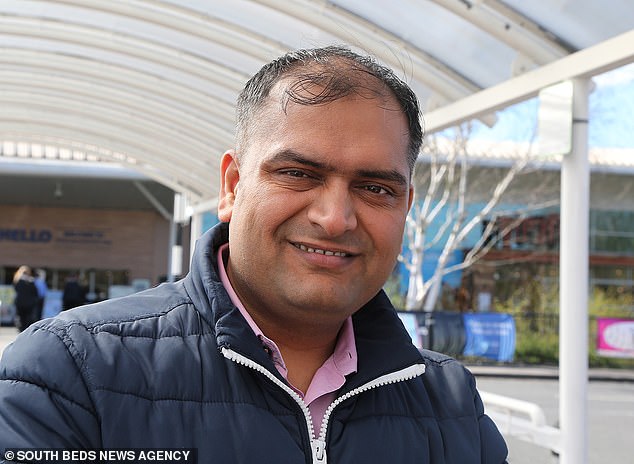

Dhaval Pandya said: ‘It’s a brilliant idea and I’m fully behind it. I try and think carefully now about the whole issue when I go shopping’
In January, Marks & Spencer announced a trial that involves selling 90 lines of fruit and vegetables sold loose, rather than in packaging, at a store in Tolworth, south west London.
It also committed to launching additional lines of loose produce and more sustainable alternatives to plastic in every UK store, which could save 580 tonnes of plastic waste over two years alone.
It is also replacing plastic produce bags with paper ones and is phasing out plastic barcode stickers in favour of eco-friendly alternatives.
The loose produce range not only includes hard fruit and veg like potatoes and bananas, but also more perishable items such as soft fruits and berries, which are sold in compostable punnets.
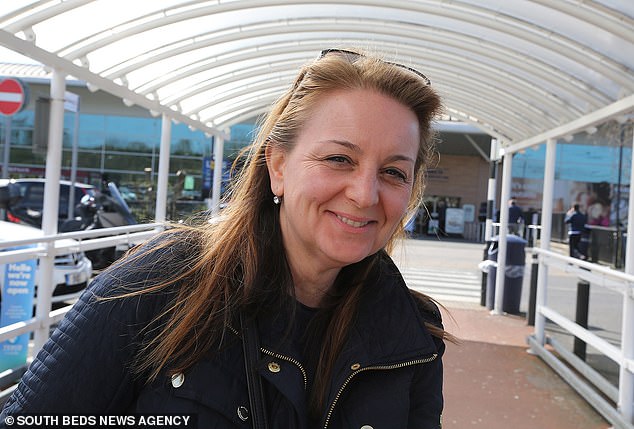

Tina Mohar said: ‘Let’s face it, the packaging can be ridiculous these days and just fills up the house’
To support the trial, M&S has introduced trained greengrocers. In addition to helping customers pick and weigh their products, they will provide tips on how best to preserve fresh produce and prevent food waste at home.
Head of Food Sustainability at M&S, Louise Nicholls, said: ‘We know our customers want to play their part in cutting out plastic, while as a business our goal is to become zero-waste by 2025.
‘That’s why we’re working hard to reduce the amount of plastic packaging we use without compromising on food quality and contributing to waste.
‘Bringing back the traditional greengrocer will play a key part in educating our customers. Our plan is to create long-term impact in the future.’
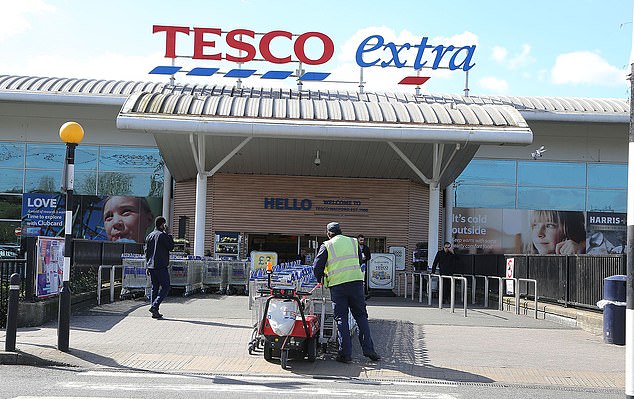

The changes at the stores in Watford (pictured today) and Swindon come as customers become increasingly aware of the harm caused by plastic packaging that cannot be recycled
Iceland has brought back greengrocer style displays in a trial at one of its larger concept stores, The Food Warehouse, in North Liverpool. Some 35 produce lines are being sold loose.
The same Iceland store is running a trial on selling 27 produce lines in plastic-free packaging such as see-through films created from plant origin cellulose, compostable punnets and nets, and paper bags.
Managing director at Iceland, Richard Walker, said: ‘Over 12 million tonnes of plastic enters the world’s oceans every year and the retail industry can no longer ignore the plastics tidal wave which is coming our way.
‘We all have a part to play in tackling the issue and Iceland is constantly looking for ways to reduce its own plastic footprint.’

